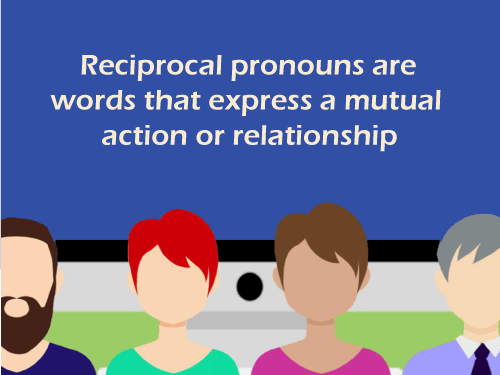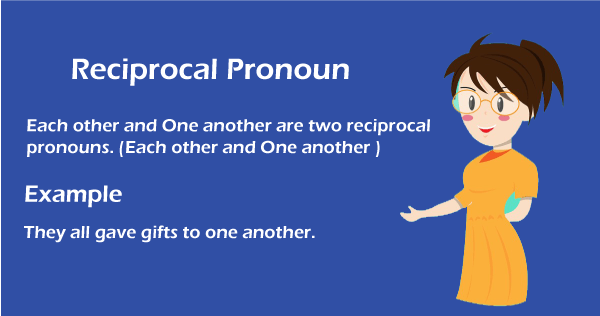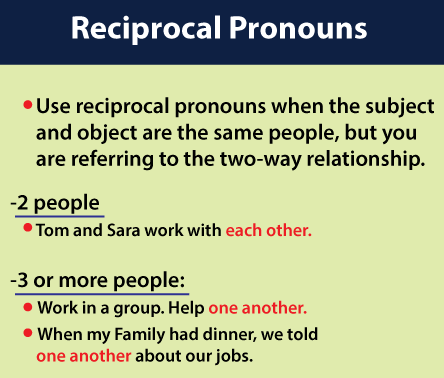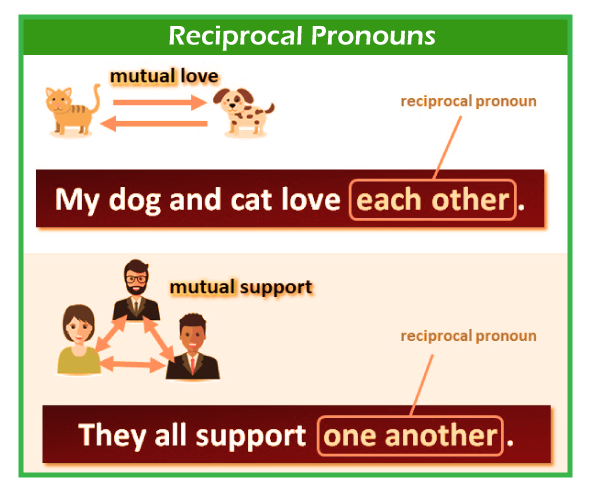Reciprocal PronounsBuddies are always willing to assist one another. Buddies are also eager to provide each other assistance during challenging times. Most significantly, friends shield each other from the dangers of poor language and common English errors. (Or is it only the two of these?) Friendship is indeed a great feeling, and this is particularly true when it pertains to the nouns and the pronouns. A pronoun is a term that can be used to substitute a noun in a sentence. In our conversation on friendship, we utilized a form of pronoun known as a reciprocal pronoun to describe what pals do for one another. 
Reciprocal pronouns are trustworthy companions who will help you freshen up your phrases. What Exactly Are Reciprocal Pronouns?A reciprocal pronoun is one which communicates a reciprocal relationship. Or, to put it in other words, reciprocal pronouns relate to situations in which someone or something does something to others and obtains the very same activity in exchange. For instance, consider the phrase Andrew and Bill assisting each other implies that Andrew aided Bill and Bill aided Andrew. As yet another example, consider the phrase- The teammates backed one another, which means that each player on the team backed/helped every other member of the group. The staff personnel who carried out the actions were also rewarded for their efforts. A reciprocal pronoun is a pronoun that indicates that two or more individuals are conducting out or have performed out some form of action, with both reaping the advantages or repercussions of that action at the same time. Reciprocal pronouns are employed whenever something is done or provided in return. The same is true whenever mutual action is conveyed. There are just two reciprocal pronouns in the English Grammar. Both of these allow you to simplify statements. They come in use when you require to explain the same overall notion more than once. Each other One another Reciprocal pronouns are simple to employ. When referring to two persons, "each other" is commonly used. " One another " is commonly used when alluding to more than two persons, such as pupils in an auditorium, "one another" is commonly used. Reciprocal Pronouns ListSeveral language guides only recognize two reciprocal pronouns, each of which consists of two words. And the reciprocal pronouns are as follow: Each Other One Another Be mindful of each other. Each Other should be used as indefinite pronouns on their own. Furthermore, the term "each" can be employed as the adjective(s) or the adverb(s), and the other can be employed as the adjective(s), adverb(s), noun(s), or even as the verb. For instance, consider the statement- Each birdie in the perch has a distinct appearance from each other.One utilizes each as an adverb in this sentence and the other as an adjective. 
Reciprocal Pronoun InstancesLet us just examine at how we employ reciprocal pronouns to convey mutual relationships in statements. Each Other
One another
What Is The Correct Way To Employ Reciprocal Pronouns?One crucial distinction between reciprocal pronouns and other pronouns should be made. Dissimilar to the other pronouns, reciprocal pronouns are only grammatically correct when they are used as the objects. This implies that a reciprocal pronoun is rarely used as the subject(s) of the sentences, clauses, or phrases. 
Bob and Jane are pals. They giggled at each other. Bob and Jane are pals. Each other giggled at them. It is also vital to understand that reciprocal pronouns are not the same as reflexive pronouns. The statement's significance will alter if these two sorts of pronouns are used interchangeably. As an instance: Sarah and Kyle kissed each other - This statement uses the reciprocal pronoun. (In this statement, Sarah kissed kyle, and Kyle kissed Sarah .) Jessica and Ken embraced themselves as a reflexive pronoun. (In this statement, Jessica embraced herself, and Ken embraced himself.) It is possible to employ the terms each other and one another as the possessive terms. The students examined each other's assignments. The countries agreed to honor one another's trading routes. Can Each Other And One Another Be Employed As Interchangeable Terms?Few guidelines may say that each other and one another have distinctive connotations. One prevalent belief is that each other can only allude to two individuals/ items, and one another can only relate to more than two individuals/ items. This is not the reality in the regular usage. It is totally acceptable in ordinary writing and speech to use each other to allude to more than two individuals/ items and to employ the term one another to allude to two individuals/ things. Everyone in the exam room was wary of each other. Peter and Diana quizzed each other with papers. 
Reciprocal Pronoun ExamplesReciprocal pronouns help to avoid phrase duplication. For clarity, reciprocal pronouns have been italicized in the examples given.
Next TopicAdverb
|
 For Videos Join Our Youtube Channel: Join Now
For Videos Join Our Youtube Channel: Join Now
Feedback
- Send your Feedback to [email protected]
Help Others, Please Share









